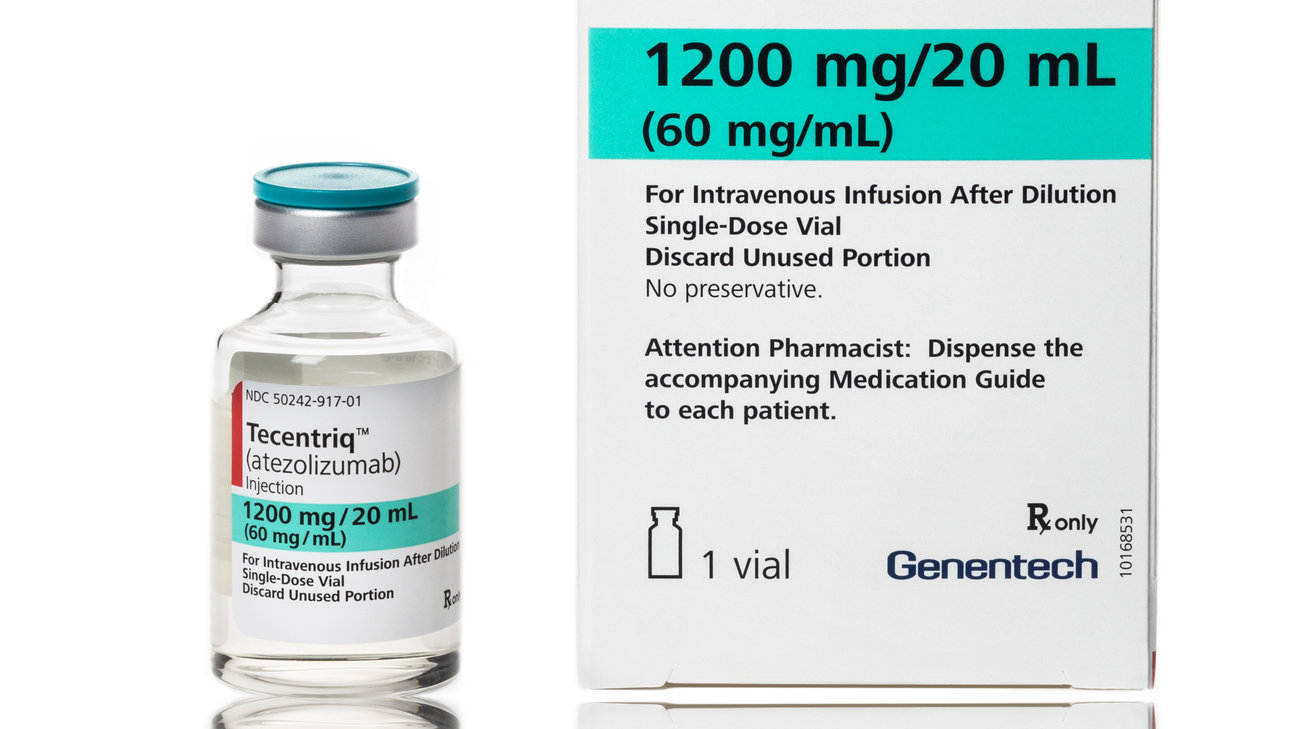Tecentriq (Atezolizumab) vs Keytruda (pembrolizumab)
Tecentriq (Atezolizumab) vs Keytruda (pembrolizumab)
Tecentriq (atezolizumab) and Keytruda (pembrolizumab) are both immunotherapy drugs that work by targeting and inhibiting specific proteins to help the immune system recognize and fight cancer cells. Tecentriq targets the protein PD-L1, which some cancer cells express to avoid immune detection, and is approved for use in certain types of bladder, lung, breast, and other cancers. Keytruda targets the PD-1 receptor on immune cells and is used to treat a wider range of cancers, including melanoma, lung cancer, head and neck cancer, and others; the choice between these medications would depend on the specific type of cancer, its PD-L1 expression, and individual patient factors, with a healthcare provider's guidance being essential in making the right decision.
Difference between Tecentriq and Keytruda
| Metric | Tecentriq (Atezolizumab) | Keytruda (pembrolizumab) |
|---|---|---|
| Generic name | Atezolizumab | Pembrolizumab |
| Indications | Urothelial carcinoma, non-small cell lung cancer, triple-negative breast cancer, small cell lung cancer, hepatocellular carcinoma, and others | Melanoma, non-small cell lung cancer, head and neck squamous cell cancer, classical Hodgkin lymphoma, urothelial carcinoma, microsatellite instability-high cancer, gastric cancer, esophageal cancer, cervical cancer, hepatocellular carcinoma, Merkel cell carcinoma, renal cell carcinoma, endometrial carcinoma, and others |
| Mechanism of action | PD-L1 inhibitor, blocks the interaction of PD-L1 with PD-1 and B7.1 receptors | PD-1 inhibitor, blocks the interaction between PD-1 and its ligands, PD-L1 and PD-L2 |
| Brand names | Tecentriq | Keytruda |
| Administrative route | Intravenous infusion | Intravenous infusion |
| Side effects | Fatigue, decreased appetite, nausea, urinary tract infection, fever, and constipation | Fatigue, cough, nausea, itching, rash, decreased appetite, constipation, joint pain, and diarrhea |
| Contraindications | Individuals with hypersensitivity to atezolizumab or any of its excipients | Individuals with hypersensitivity to pembrolizumab or any of its excipients |
| Drug class | Monoclonal antibody, immune checkpoint inhibitor | Monoclonal antibody, immune checkpoint inhibitor |
| Manufacturer | Genentech (Roche) | Merck & Co. |
Efficacy
Tecentriq (Atezolizumab) in Treating Lung Cancer
Tecentriq (atezolizumab) is a monoclonal antibody designed to target and inhibit the programmed death-ligand 1 (PD-L1), which is involved in the suppression of the immune system. By inhibiting PD-L1, Tecentriq may enhance the body's immune response against cancer cells. In the context of lung cancer, Tecentriq has shown efficacy in treating non-small cell lung cancer (NSCLC), particularly in patients whose tumors express PD-L1 and who have not received prior chemotherapy. The drug has been approved for use in several countries based on clinical trials that demonstrated improved survival rates in comparison to traditional chemotherapy.
One of the pivotal clinical trials for Tecentriq, the OAK study, showed that patients with previously treated NSCLC had a median overall survival of 13.8 months when treated with Tecentriq, compared to 9.6 months with docetaxel, a standard chemotherapy agent. This improvement in survival was particularly notable in patients with high PD-L1 expression in their tumors. Additionally, Tecentriq has been evaluated in combination with other therapies, which may offer further benefits for certain patient populations.
Keytruda (Pembrolizumab) in Treating Lung Cancer
Keytruda (pembrolizumab) is another monoclonal antibody that targets the programmed cell death protein 1 (PD-1) receptor on immune cells. By blocking this receptor, Keytruda helps to activate T cells to recognize and attack cancer cells. Pembrolizumab has been extensively studied in lung cancer, specifically NSCLC, and has been approved for the treatment of patients with metastatic NSCLC whose tumors express PD-L1, as well as for the first-line treatment of certain patients with NSCLC, depending on the tumor's genetic characteristics.
The efficacy of Keytruda in lung cancer was highlighted in the KEYNOTE-024 trial, where pembrolizumab significantly improved progression-free survival and overall survival compared to standard chemotherapy in patients with high PD-L1 expression and no EGFR or ALK genomic tumor aberrations. The median overall survival was not reached for pembrolizumab at the time of the analysis, compared to 14.2 months for chemotherapy. Furthermore, Keytruda has shown benefits when used in combination with other treatments, including chemotherapy and targeted therapies, which can provide additional options for patients with advanced lung cancer.
Regulatory Agency Approvals
Tecentriq
-
European Medical Agency (EMA), European Union

-
Food and Drug Administration (FDA), USA

-
Health Canada

-
Pharmaceuticals and Medical Devices Agency (PMDA), Japan

-
Therapeutic Goods Administration (TGA), Australia

-
Medsafe (NZ)

Keytruda
-
European Medical Agency (EMA), European Union

-
Food and Drug Administration (FDA), USA

-
Health Canada

-
Therapeutic Goods Administration (TGA), Australia

-
Medsafe (NZ)

Access Tecentriq or Keytruda today
If Tecentriq or Keytruda are not approved or available in your country (e.g. due to supply issues), you can access them via Everyone.org.
How it works

Make an enquiry
Choose the medicine you want to buy, answer a couple of questions, and upload your prescription to speed things up. We’ll get back to you within 24 hours.


Make an enquiry
Choose the medicine you want to buy, answer a couple of questions, and upload your prescription to speed things up. We’ll get back to you within 24 hours.


Breeze through the paperwork
We'll guide you through the required documents for importing unapproved medicine, ensuring you have all the necessary information.


Get a personalized quote
We’ll prepare a quote for you, including medicine costs and any shipping, administrative, or import fees that may apply.


Receive your medicine
Accept the quote and we’ll handle the rest - sourcing and safely delivering your medicine.

Some text on this page has been automatically generated. Speak to your physician before you start a new treatment or medication.
Let's talk
If you have any questions, call us or send us a message through WhatsApp or email:
Contact us




